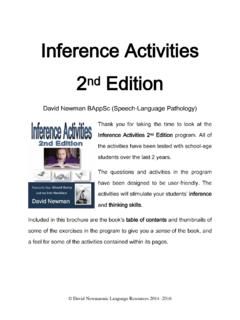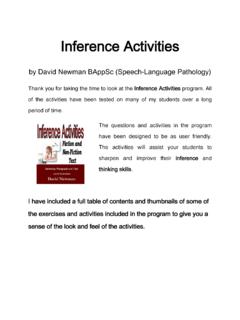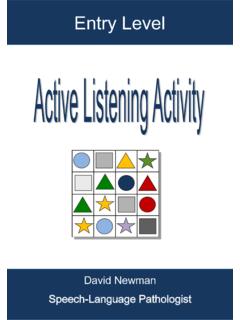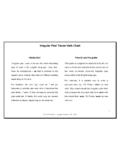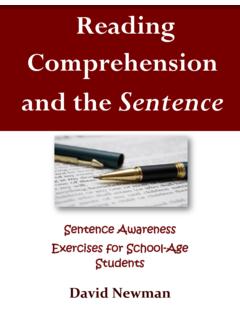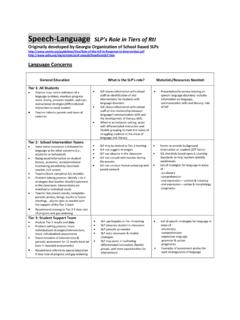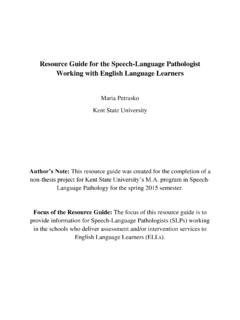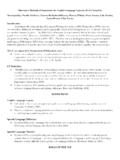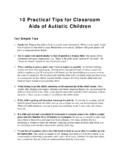Transcription of David Newman Speech-Language Pathologist
1 David Newman Speech-Language Pathologist A Friendly Reminder David Newmonic language Resources 2015 - 2018 This program and all its contents are intellectual property. No part of this publication may be stored in a retrieval system, transmitted or reproduced in any way, includ-ing but not limited to digital copying and printing without the prior agreement and written permission of the author. However, I do give permission for class teachers or Speech-Language pathologists to print and copy individu-al worksheets for student use.
2 Table of Contents Phonological Awareness Introduction .. 1 Differences between phonological awareness and phonics .. 1 Phonological Awareness .. 1 Phonemic Awareness .. 2 Phonics .. 3 Principles of Intervention .. 4 When to Deliver .. 4 Order of Delivery .. 5 Description of Tasks and 5 Planning Effective Intervention .. 7 Scaffolding Principles .. 13 Phonemic Intervention Prompts and Cues .. 14 Segmenting Phonemes CV & VC Example .. 15 Segmenting Phonemes CVC Example .. 19 Rating Progress .. 23 References .. 24 Appendix.
3 25 David Newman 1 Phonological Awareness - Introduction Children need good phonological awareness skills when first learning to read. Suc-cessful early reading requires the child to efficiently and accurately make the crucial sound/letter link. Research compiled over the last three decades has clearly linked phonological awareness with early reading skills. In fact phonological awareness is considered the leading predictor of a child s reading success or failure. Phonological awareness is the ability of an individual to consciously break down words to individual sounds (phonemes), to understand that phonemes can be repre-sented as symbols (letters), and to synthesize speech sounds embodied as letters into words, and later written phrases, sentences and stories.
4 It s worth repeating that there is a significant link between good phonological aware-ness and reading skill. Children with proficient phonological awareness skills are well placed to read and decode relatively easily. Children who don t have good phonolog-ical awareness skills are at risk of not making the sound/letter link, which can later result in decoding difficulty and ultimately reading failure. Differences between Phonological Awareness, Phonemic Awareness and Phonics Phonological Awareness Phonological awareness enables children to be aware of and mentally sort through the sound structure of oral language .
5 Phonological awareness is an important met-alinguistic skill. The term awareness is a factor in this skill. The dictionary defines awareness as 'having knowledge of, being cognizant and conscious ' This is cer-tainly true of phonological awareness. When a child becomes conscious of speech sounds they can better devote mental energy to analysing the sound structure of dif-2 ficult words or concepts. Children who are naturally blessed with this skill have an advantage over children that struggle with sound awareness.
6 When watching pre-school children with typically developing language skills play with language , you may notice that their minds busily sort through and experiment with new sounds and words. Children become increasingly aware of the different sounds individual phonemes make and become more conscious of the rhythms and com-plexities of speech . Unfortunately, a percentage of children have difficulty with sound awareness, particularly children with language impairment. They tend to not develop adequate phonological awareness and often need to be explicitly taught these skills.
7 Some specific phonological awareness tasks are to be aware of the sound structure of language , be able to break down words into syllables, identify and produce rhymes and be able to identify the first phoneme in words. Phonemic Awareness Phonemic awareness is a sub-set of skills that resides under the phonological awareness umbrella. Phonemic awareness requires a deeper understanding of the sound structure of language . As the title suggests, understanding is at the level of the phoneme single sound awareness.
8 A child with good phonemic awareness skills is able to manipulate and isolate individual sounds, or phonemes. This skill becomes vital when a child later moves from analysing sounds to analysing print. Phonemic awareness skill is crucial for decoding print. The child that has difficulty breaking down or segmenting a word into individual sounds is at risk for reading dis-order. Specific phonemic awareness tasks include identifying rime and onset, seg-menting initial and final sounds, blending sounds into words, segmenting words into individual sounds and manipulating sounds.
9 A key feature of both phonological and phonemic awareness is that a child is only required to analyse or manipulate sounds in spoken words. Neither skill requires the child to engage with print. In its purest form, only spoken stimuli are needed to suc-cessfully engage a child in phonological or phonemic awareness tasks. David Newman 3 Phonics In phonics, children need to match speech sounds to printed symbols - the al-phabet, which makes phonics considerably different from phonological aware-ness.
10 As stated previously, in phonological and phonemic awareness tasks the fo-cus is on spoken language . Phonics tasks focus on linking speech sounds to letter symbols. But, for children to successfully decode printed letters and words, they re-quire good phonological and phonemic awareness skills. Which is perhaps why pho-nological awareness is considered by many researchers and reading experts as the leading predictor of reading success or failure. Though phonological and phonemic awareness skills are important in early reading, they do not guarantee success with decoding and spelling.


